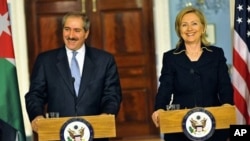Secretary of State Hillary Clinton is urging all parties in the political upheaval in Egypt to exercise restraint and avoid violence. She called for the government of Egyptian President Hosni Mubarak, a key U.S. ally, to seize the moment and implement reforms.
Secretary of State Hillary Clinton made the public appeal to Egyptians at a joint news event with Jordanian Foreign Minister Nasser Judeh, after talks dominated by the recent unrest in Egypt and Tunisia and stalled Israeli-Palestinian peace efforts.
In calling for restraint by all the parties in Egypt, Clinton said the United States has consistently urged the Mubarak government to be responsive to calls for greater political reform and openness.
"We support the universal rights of the Egyptian people including the rights to freedom of expression, association and assembly," she said. "And we urge the Egyptian authorities not to prevent peaceful protests or block communications, including on social media sites. We believe strongly that the Egyptian government has an important opportunity at this moment in time, to implement political, economic and social reforms to respond to the legitimate needs and interests of the Egyptian people."
Jordan has also been the scene of anti-government protests in recent weeks. But Clinton stressed U.S. support for Jordanian reform efforts, noting parliamentary elections there in November that international observers held to be fair and transparent.
Foreign Minister Judeh, stressed his government’s tolerance of public protests he said were understandable given economic problems in his import-dependent country.
"I think that we have to differential between economic hardship, which we have, and also many countries around the world," he said. "Jordan is not living in a bubble. It is part and parcel of the fabric of these international economies. And between political stability, which we are blessed with in Jordan, with the Hashemite leadership - his majesty the king - who initiates reform from within."
Foreign Minister Judeh cast the stalled Israeli-Palestinian peace process as the region’s key problem. He said a resolution of the conflict could trigger economic integration and progress that could temper anger now being seen in demonstrations.
Clinton said the Obama administration remains committed to the peace process even though President Barack Obama made no mention of it in his State of the Union address.
"Make no mistake. We are absolutely committed to the process, and we believe that a framework agreement that resolves the core issues not only remains possible, but necessary," she said. "As the foreign minister said, he will be meeting later with [U.S. envoy] George Mitchell. We have a constant dialogue going on with many of our friends and partners in the region and around the world. We remain committed to a two-state solution."
Clinton said she will meet late next week in Munich with U.S. partners in the international Middle East Quartet - Russia, the European Union and the United Nations. The grouping formed in 2002 has lately focused on building the infrastructure for Palestinian statehood.
Clinton Urges Restraint, Political Reform in Egypt

